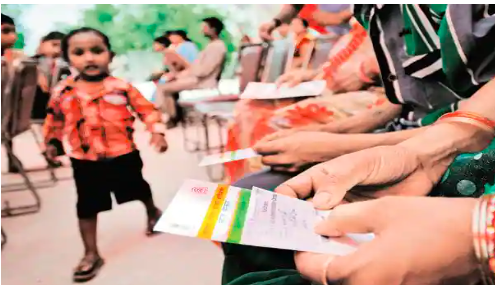Praveen Chakravarty
August 26, 2015
 Photo: Priyanka Parashar/Mint
Photo: Priyanka Parashar/Mint
There is too much fear-mongering about Aadhaar and the danger to individual privacy. This is far from the truth On a chilly afternoon on 5 December 2010 in Churchu block in Hazaribagh district in Jharkhand, a poor rural woman (let’s call her Asha) held my hand to thank me, after I told her that going forward, it may be possible to collect her wages from the National Rural Employment Guarantee (NREGA) programme directly by herself through her bank’s business correspondent at her doorstep. “Sitaar wale bank se milega?” (Will I get it from the star bank?) she asked referring to Bank of India’s logo of a star. I was there as a member of the Unique Identity Authority of India (UIDAI) for a pilot of Aadhaar-enabled NREGA payments. The initiative was to test people’s responses to a choice of receiving NREGA wages by themselves and not through an intermediary at their doorstep using their Aadhaar number. 100% of the villagers in Churchu block demonstrated their approval by enrolling for the programme. In an ensuing conversation, Asha told me that her erratic husband collects her NREGA wages and spends it outside the family.
Alas, four days before India’s 69th Independence Day, a bench of the Supreme Court ruled in an interim judgment which implies that Asha cannot be provided this choice of collecting her NREGA wages at her doorstep. That Asha’s fingerprints or iris scans, which would have been matched to prove that it is indeed her before the money was handed over, is a violation of her privacy, seems to be the prevailing view. Yet, this is precisely what Asha seems to want—that her wages due to her be given only to her and not anyone else. This seemingly complex conundrum is what is at the heart of the Supreme Court’s ruling on 11 August 2015.
Implicit bargains is a well researched and accepted concept in modern economics and political science. The American economist Arthur Okun, popular for creating the misery index, called implicit bargains “an invisible handshake”. What it means in Asha’s case is simply this—if Asha, aware of the supposed privacy costs of receiving her NREGA wages directly by herself, chooses to opt to receive her wages through her Aadhaar verification, she has entered into an implicit bargain with the state. Should she be denied this opportunity?
To be sure, there are three indisputable facts in this example. That Asha cannot be denied her NREGA wages due to non-possession of Aadhaar. That NREGA administrators can plug leakages due to ghosts and duplicates using Aadhaar’s biometric verification. That Asha would like her wages to be paid only to her and not anyone else. It is then evident that Asha must be given this choice of receiving NREGA wages directly through Aadhaar with supposed costs of privacy versus receiving wages through an intermediary in the current form.
Yet, the Supreme Court ruling makes this choice impossible. Choices and implicit bargains are a daily phenomenon in the lives of us educated elite. We choose to have Flipkart.com remember our credit card numbers for quick and efficient purchases, or we don’t for fear of misuse. We choose to use the e-channel for faster immigration at various foreign airports using biometrics or we don’t. Pray, why cannot Asha choose to liberate herself from her tyrannical husband and get her wages directly? Why cannot I choose to give my Aadhaar number to the Election Commission in return for ease of voter record updation or e-voting in the future?
The Supreme Court has rightly suggested that the government should advertise extensively that no citizen will be denied benefits for lack of an Aadhaar. The trade-offs, if any, in claiming a benefit through Aadhaar verification need to be made abundantly clear to the beneficiary. But to argue that providing this choice is coercion in disguise is both patronizing and insulting to the common man. The tenor and principle of the entire basis for the ruling by the Supreme Court is against state force, yet pitifully, the eventual ruling has choked choices for citizens, leaving them at the mercy of the state.
Ironically, the apex court bench indulges in its own choices and picks PDS and LPG schemes as the only ones that can use Aadhaar data and not others! An individual’s right to privacy is as inalienable as her right to choose. Programmes that can reap efficiencies through an Aadhaar verification process, state welfare or otherwise, should be allowed to provide this choice to their users.
And as an aside, amid all this fear-mongering on Aadhaar’s biometric data, it is yet undemonstrated by its critics how a query to an Aadhaar database matching fingerprints to exact a “yes” or a “no” answer can invade one’s lives. Ironically, a simple Google search of an Aadhaar privacy fear-monger revealed her voter ID number, address, phone number and age, more information than one can ever get out of an Aadhaar database.
Praveen Chakravarty is a visiting fellow at IDFC Institute and a former member of the Unique Identification Authority of India.
https://www.livemint.com/Opinion/706Zy4IwkDnDeJFuml2pzO/Aadhaar-and-its-implicit-bargains.html
